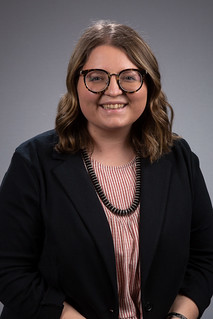Justice focuses on the needs of beef cattle producers
In a way, Justice was born into her career.
By Mary Hightower
U of A System Division of Agriculture
Sept. 13, 2023
Fast facts
- Justice serves as extension beef cattle specialist
- South Carolina native raised on a cow-calf operation
- Wants to help ranchers, county agents
(642 words)
(Newsrooms: With headshot of Maggie Justice)
LITTLE ROCK — About a year after Maggie Justice discovered a passion for animal science research as a sophomore at Clemson University, she found what would become her credo: “What does this mean for our producers?”
Justice joined the University of Arkansas System Division of Agriculture as an assistant professor and beef cattle specialist for the Cooperative Extension Service in May.
In a way, Justice was born into her career.
“I grew up on a commercial cow-calf operation in South Carolina,” she said. Justice said she and her three sisters “learned to work on the farm and were part of the cattle operation. Like most of our cattle farmers, especially in the Southeast, it was secondary income.”
Justice’s father was a retired lawyer and her mother was a school teacher but “the farm was definitely a family affair on the weekends,” she said.
Growing up, “I was very active in 4-H and came to love extension because of my time in 4-H,” Justice said.
Justice followed in all of the family’s footsteps, heading to Clemson University. She knew she wanted to study animal science but didn’t want to go to vet school.
“I was kind of steered toward research as an undergrad and started that as a sophomore, and fell in love with it,” she said. “Luckily, I had a great mentor that I stayed on with for my master’s. She noticed that I like to talk to people, and kind of noticed I had a passion, in that I always asked her questions about ‘what did her research mean for our producers?’”
That mentor is Susan Duckett, professor and Ernest L. Corley Jr. Trustees endowed
chair of the Animal and Veterinary Sciences department at Clemson.
About a year into the research, Justice told Duckett that she “wanted to be an extension
specialist so I could help producers like the ones I grew up with.”
Going her own way
Justice gives a lot of credit to her dad, who raised four girls.
“My dad is the ultimate girl dad. He instilled in all four of us that we could do anything we set our minds to,” she said.
That “anything” included Justice’s passion for shooting sports, especially shotgun. She was a competitive shooter in 4-H and also for her high school. It’s a sport she shares with her grandfather.
Justice also describes herself as a “horse girl.”
“As far as horse stuff goes, I was the black sheep of the family,” she said.
“My sisters rodeoed and actually had a younger sister who went to school on a rodeo scholarship. But I showed horses,” Justice said. “I showed Western pleasure and hunter under saddle. Because of that, I was super competitive in the 4-H education contests; horse bowl, hippology, was a horse ambassador for the state and then eventually was a state officer because of my involvement in the horse project.”
Adapting to Arkansas
She has enjoyed her newly adopted state.
“I love Arkansas. Everyone has been so welcoming, so open to my program, and excited for me which has made my job easy and enjoyable,” Justice said. “I’m just excited to help the agents build their programs in their counties and ultimately help the producers in this state.”
Mike Looper, head of animal science for the Dale Bumpers College of Agricultural, Food and Life Sciences and the Division of Agriclture, said Justice earned the job amid an “extremely strong applicant pool.”
“When Maggie interviewed for the job, we knew she was the perfect fit for the department as well as for our beef producers in Arkansas,” he said. “You might say she came in on day one and embraced extension and the idea of helping farmers and ranchers be more efficient, and ultimately more profitable.”
Justice received her master’s degree at Clemson and her Ph.D. at Auburn University.
To learn about extension programs in Arkansas, contact your local Cooperative Extension
Service agent or visit www.uaex.uada.edu. Follow us on Twitter and Instagram at @AR_Extension. To learn more about Division
of Agriculture research, visit the Arkansas Agricultural Experiment Station website: https://aaes.uada.edu/. Follow us on Twitter at @ArkAgResearch. To learn more about the Division of Agriculture,
visit https://uada.edu/. Follow us on Twitter at @AgInArk.
About the Division of Agriculture
The University of Arkansas System Division of Agriculture’s mission is to strengthen
agriculture, communities, and families by connecting trusted research to the adoption
of best practices. The Division of Agriculture conducts research and extension work
within the nation’s historic land grant education system through the Agricultural
Experiment Station and the Cooperative Extension Service.
The Division of Agriculture is one of 20 entities within the University of Arkansas
System. It has offices in all 75 counties in Arkansas and faculty on five system campuses.
The University of Arkansas System Division of Agriculture offers all its Extension
and Research programs to all eligible persons without regard to race, color, sex,
gender identity, sexual orientation, national origin, religion, age, disability, marital
or veteran status, genetic information, or any other legally protected status, and
is an Affirmative Action/Equal Opportunity Employer.
# # #
Media contact: Mary Hightower
mhightower@uada.edu
